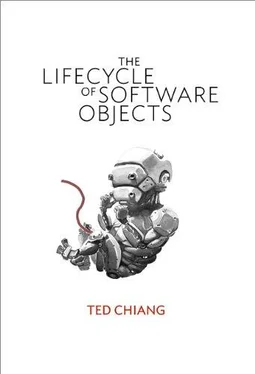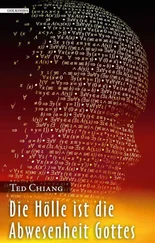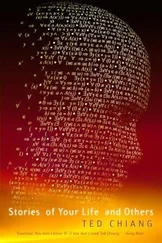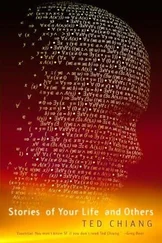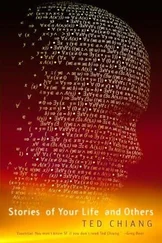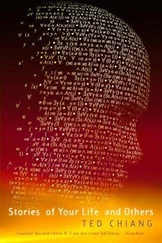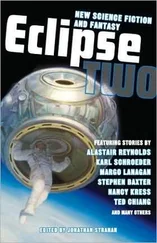The question of whether Marco or Polo would ever be intellectually capable of becoming corporations is another question, and to Derek’s mind a more difficult one to answer. The Neuroblast digients have shown that they can do homework on their own, and he’s confident that their attention spans for independent tasks will increase steadily over time, but even if they become able to do sizeable projects without supervision, that’s still a far cry from being able to make responsible decisions about one’s future. And he’s not even sure if that level of independence is something he should encourage Marco and Polo to have as a goal. Turning Marco and Polo into corporations opens the door to keeping them running after Derek himself has passed away, which is a worrisome prospect: for Down Syndrome individuals, there are organizations that provide assistance to people living on their own, but similar support services don’t exist for incorporated digients. It might be better to ensure that Marco and Polo are suspended in the event that Derek can’t take care of them.
Whatever he decides to do, he’ll have to do it without Wendy; they’ve decided to file for divorce. The reasons are complicated, of course, but one thing is clear: raising a pair of digients is not what Wendy wants from life, and if Derek wants a partner in this endeavor, he’ll have to find someone else. Their marriage counselor has explained that the problem isn’t the digients per se, it’s the fact that Derek and Wendy can’t find a way to accommodate their having different interests. Derek knows the counselor’s right, but surely having common interests would have helped.
He doesn’t want to get ahead of himself, but he can’t stop thinking that getting divorced offers him an opportunity to be more than just friends with Ana. Surely she’s considered the possibility too; after all the time they’ve known each other, how could she not have? The two of them would make a great team, working together for what’s best for their digients.
Not that he plans to declare his feelings at lunch; it’s too soon for that, and he knows Ana is seeing someone right now, a guy named Kyle. But their relationship is fast approaching the six-month mark, which is usually when the guy realizes that Jax isn’t just a hobby, but the major priority in her life; it probably won’t be long before the breakup follows. Derek figures that in telling Ana about his divorce, he’ll be reminding her that there are other options, that not every guy will think of digients as competition for her attention.
He looks around for Ana in the restaurant, sees her and waves; she gives him a big grin. When he reaches the table he says, “You won’t believe what Marco and Polo just did.” He tells her what happened, and her jaw drops.
“That’s amazing,” she says.”God, I’ll bet Jax has heard the same things they have.”
“Yeah, you might want to have a conversation with him when you get home.” This leads to talking about the benefits and drawbacks of giving the digients access to social forums. The forums offer richer interaction than the owners can supply by themselves, but not all the influences the digients receive are positive ones.
After they’ve discussed digients for a while, Ana asks, “So aside from that, what’s new with you?”
Derek sighs. “I might as well tell you: Wendy and I are getting divorced.”
“Oh no. Derek, I’m so sorry.” Her sympathy is genuine, and it warms him.
“It’s been a long time coming,” he says.
She nods. “Still, I’m sorry it’s happening.”
“Thanks.” He talks for a while about what he and Wendy have agreed upon, how they’ll sell the condo and split the proceeds. Thankfully the process is mostly amicable.
“At least she doesn’t want copies of Marco and Polo,” says Ana.
“Yeah, thank goodness for that,” agrees Derek. A spouse can almost always make a copy of a digient, and when a divorce isn’t amicable, it’s all too easy to use one to get back at one’s ex. They’ve seen it happen on the forums many times.
“Enough of that,” says Derek. “Let’s talk about something else. What’s happening with you?”
“Nothing, really.”
“You looked like you were in a good mood until I started talking about Wendy.”
“Well, yeah, I was,” she admits. “So is there something in particular that’s got you feeling so upbeat?”
“It’s nothing.”
“Nothing’s got you in a good mood?”
“Well, I have some news, but we don’t have to talk about it now.”
“No, don’t be silly, it’s fine. If you’ve got good news, let’s hear it.”
Ana pauses and then, almost apologetically, says, “Kyle and I have decided to move in together.”
Derek is stunned. “Congratulations,” he says.
Two more years pass. Life goes on.
Occasionally Ana, Derek, and the other education-minded owners have their digients take some standardized tests, to see how they compare with human children. The results vary. The Faberge digients, being illiterate, can’t take written tests, but they seem to be developing well according to other metrics. Among the Origami digients, there’s a curious split in the test results, with half continuing to develop over time and half hitting a plateau, possibly due to a quirk in the genome. The Neuroblast digients do reasonably well if they’re permitted the same allowances in testing that dyslexic humans are given; while there’s variation between the individual digients, as a group their intellectual development continues apace.
What’s harder to gauge is their social development, but one encouraging sign is that the digients are socializing with human adolescents in various online communities. Jax becomes interested in tetrabrake, a subculture focused on virtual dance choreography for four-armed avatars; Marco and Polo have each joined a fan club for a serial game drama, and each regularly tries to convince the other of the superiority of his choice. Even though Ana and Derek don’t really understand the appeal of these communities, they like the fact that their digients have become part of them. The adolescents who dominate these communities seem unconcerned with the fact that the digients aren’t human, treating them as just another kind of online friend they are unlikely to meet in person.
Ana’s relationship with Kyle has its ups and downs, but is generally good. They occasionally go out with Derek and whomever he’s dating; Derek sees a series of women, but nothing ever becomes serious. He tells Ana that it’s because the women he dates don’t share his interest in digients, but the truth is that his feelings for Ana refuse to go away.
The economy goes into a recession after the latest flu pandemic, prompting changes in the virtual worlds. Daesan Digital, the company that created the Data Earth platform, makes a joint announcement with Viswa Media, creator of the Real Space platform: Data Earth is becoming part of Real Space. All Data Earth continents will be replaced by identical Real Space versions added to the Real Space universe. They’re calling it a merger of two worlds, but it’s just a polite way of saying that, after years of upgrades and new versions, Daesan can no longer afford to keep fighting the platform wars.
For most customers, all this means is that they can travel between more virtual locations without logging out and in again. Over the last few years, almost all of the companies whose software runs on Data Earth have created versions that run on Real Space. Gamers who play Siege of Heaven or Elderthorn can simply run a conversion utility, and their inventories of weapons and clothing will be waiting for them on the Real Space versions of the game continents.
Читать дальше
